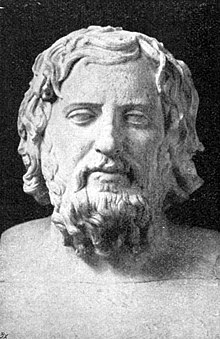利用者:Dormiam/sandbox
 |
ここはDormiamさんの利用者サンドボックスです。編集を試したり下書きを置いておいたりするための場所であり、百科事典の記事ではありません。ただし、公開の場ですので、許諾されていない文章の転載はご遠慮ください。
登録利用者は自分用の利用者サンドボックスを作成できます(サンドボックスを作成する、解説)。 その他のサンドボックス: 共用サンドボックス | モジュールサンドボックス 記事がある程度できあがったら、編集方針を確認して、新規ページを作成しましょう。 |

Enkrateia (Greek ἐγκράτεια, "in power - from ἐν (en, “in”) + κράτος (krátos, “power”). Enkrateia comes from the adjective enkratês (ἐγκρατής from ἐν (en, “in”) which means possession, power over something or someone else + κράτος (krátos, “power”)). It results in the meaning of power over yourself, power over your own passions and instincts, self-control and self-mastery.
During Socrates' life three of his disciples, Isocrates, Xenophon and Plato, transformed the adjective enkratês to the noun enkrateia and gave it a different meaning: with them, enkrateia meant not power over something or someone else but power over yourself, power over your own passions and instincts, self-control.[1]
For Aristotle, enkrateia is the antonym of akrasia (ἀκρασία from ἀ = without + κράτος = power, control) which means "lacking command (over oneself)".[2] In this sense, enkrateia is the state of performing what is known to be a positive choice because of its positive consequences as opposed to akrasia, which is the state of performing what is known to be not a positive choice (because of its negative consequences), but nevertheless performing it because of its immediate pleasures.[3]
To Xenophon, enkrateia is not a particular virtue but "the foundation of all virtues".[4]
Enkrateia is mentioned thrice in the New Testament, in the lists of virtues in Acts 24:25, Galatians 5:23, and 2 Peter 1:6. The King James Version renders the word "temperance."[5]
See also
[編集]Notes
[編集]- ^ Jaeger, W. (1943) Paideia: The Ideals of Greek Culture. Volume 2: In Search of the Divine Centre. New York and Oxford: Oxford University Press. pp 52-57
- ^ http://plato.stanford.edu/entries/aristotle-ethics/#Akr
- ^ Akrasia in Greek Philosophy: From Socrates to Plotinus (2007) Christopher Bobonich and Pierre Destrée (ed.) Brill. p. 9
- ^ Jaeger, W. (1943) Paideia: The Ideals of Greek Culture. Volume 2: In Search of the Divine Centre. New York and Oxford: Oxford University Press. p. 54
- ^ Strong's Concordance, Word no. 1466, https://biblehub.com/greek/strongs_1466.htm
